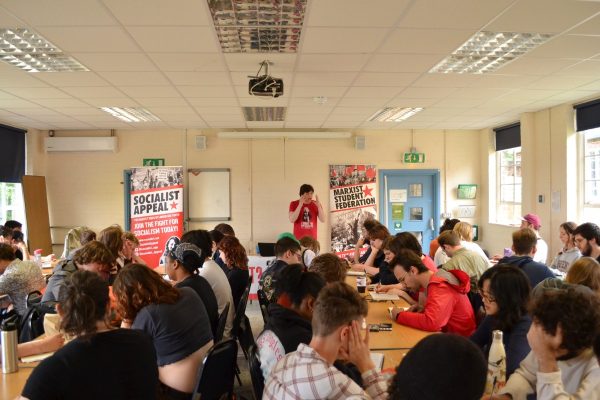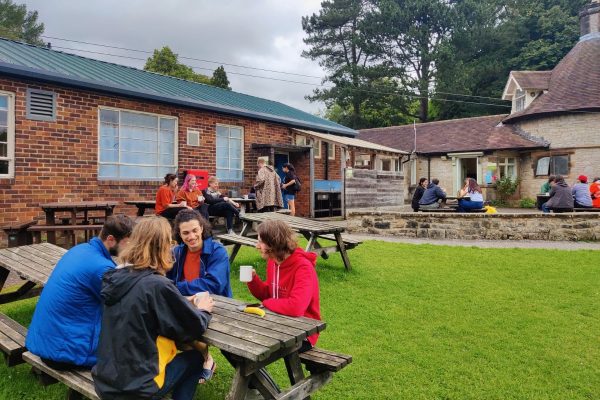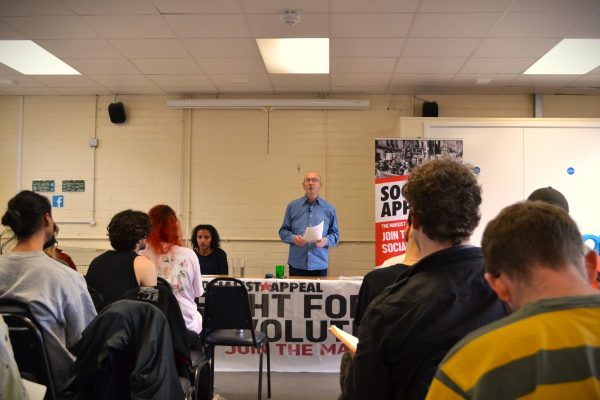Last weekend, comrades from across the British section of the IMT gathered for this year’s Marxist Summer Camp, themed around the Communist International. Attendees left feeling educated, energised, and ready to build the forces of Marxism.
Between 14-16 July, over 110 comrades from across Britain – along with visitors from the recently-founded Irish group of the IMT – travelled to the Peak District to participate in the Marxist Student Federation’s second residential Marxist Summer Camp.
The theme of this year’s school was ‘The lessons of the Communist International’. Founded in 1919 by Lenin and Trotsky as a vehicle for world socialist revolution, the debates and resolutions of the first four congresses of the Comintern offer a treasure trove of communist theory, strategy, and tactics.
Over the weekend, every comrade rolled up their sleeves and got stuck in with the running of the camp – whether it was cooking, bartending, cleaning, or running the Wellred Books tent. This teamwork brought comrades closer together, and helped the event to run as seamlessly as possible – apart from a few flooded tents!
Unbroken thread
The weekend opened with a session on the history of Communist International, introduced by Fiona Lali, a national organiser for the MSF.
All set up and ready for the opening session of the Marxist Student Summer Camp 2023. We're kicking off the event by discussing The History of the International: From Marx To Trotsky. 🚩🚩 pic.twitter.com/zvY56zpYJB
— Marxist Student (@MarxistStudent) July 14, 2023
Fiona traced the unbroken thread of genuine Marxism: from the International Working Men’s Association set up by Marx and Engels; through the rise and fall of the Comintern; to our efforts to build an international as part of the IMT today.
As Trotsky explained to the first congress of the Comintern, the role of an international is to “generalise the revolutionary experience of the working class” – to act as its living memory and guide the struggle to victory.
Comrades came into the discussion covering different aspects of this rich history: the battle between Marxism and anarchism in the First International; the reformist degeneration of the Second International; Lenin and Trotsky’s unwavering defence of internationalism, which laid the basis for the Third International; and much more.
Following dinner in the evening, comrades spent time huddled around the warmth of a campfire singing revolutionary songs from across the world, such as Bella Ciao, El Pueblo Unido, and Die Arbeiter von Wien.
Comrades at the MSF Summer Camp 2023 singing Die Arbeiter von Wien, a revolutionary Austrian workers' song.#MarxistStudentFederation #IMT #SocialistAppeal #AreYouACommunist #communism #communist #marxism #marxist #revolution #socialist #socialism pic.twitter.com/lsf3f5FnmL
— Daniel (@danthecommunist) July 15, 2023
The mood was electric, with one comrade describing it as “an unforgettable weekend; a perfect mixture of education and fun”.
Lessons of the Comintern
The next morning, comrades got up bright and early for the first two concurrent sessions. In one, comrades discussed the German Revolution of 1918-1923 – a revolution which was vital to the success of the world revolution.
The discussion went into the revolution’s betrayal by the Social-Democratic leaders, and the mistakes of the inexperienced German Communist Party. These mistakes, flowing from the vacillating ‘leadership’ offered by Zinoviev and Stalin, paved the way for the defeat of the German working class.
 Over the weekend, comrades took part in six political discussions covering the lessons of the Communist International / Image: Socialist Appeal
Over the weekend, comrades took part in six political discussions covering the lessons of the Communist International / Image: Socialist Appeal
In the other session, comrades discussed Lenin’s struggle against ultra-leftism: an ‘infantile disorder’ that the new and inexperienced communist parties suffered from. By refusing on principle to participate in the reformist mass organisations and bourgeois parliaments, the communist parties risked isolating themselves from the broader masses.
The discussion expanded on how communists must meet the masses where they are, using transitional demands that correspond to the stage of the class struggle, in order to raise the sights of the working class to the task of seizing power.
This discussion paired well with the afternoon’s session on the united front: a tactic adopted by the Comintern to allow the communists to reach the masses, by fighting alongside the reformist organisations, and in doing so exposing the limits of the reformist leaders. This method retains its full importance for communists to this day.
Another session focused on Stalin’s theory of ‘socialism in one country’: an anti-Marxist theory which was put forward by the Soviet bureaucracy, which began to emerge and assert their interests as the Russian Revolution degenerated.
 One comrade described the Summer Camp as “an unforgettable weekend; a perfect mixture of education and fun” / Image: Socialist Appeal
One comrade described the Summer Camp as “an unforgettable weekend; a perfect mixture of education and fun” / Image: Socialist Appeal
Comrades came into the discussion to highlight how this policy led to the mistakes and betrayals of the Comintern under Stalin, in periods like the 1925-27 Chinese Revolution, the 1926 British general strike, and Spanish Civil War in the 1930s.
This policy culminated in the transformation of the Comintern from a vehicle for world socialist revolution, into a narrow tool of Kremlin foreign policy, and in its eventual dissolution by Stalin in 1943.
Forces of Marxism
In Saturday’s final session, comrades split into groups to discuss our ongoing Are You a Communist? recruitment campaign, and how we can prepare for the upcoming university freshers period.
As one comrade remarked: “The caucus provided some great ideas for how we can use our Marxist societies as a tool for building the forces of communism on campus. We can’t wait to carry the energy of the Are You a Communist? campaign into universities and colleges!”
Comrades then braved the torrential rain for a revolutionary walk along the Monsal Trail, brandishing red flags in the beautiful surroundings of the Peak District.
After yesterday's discussions on "Socialism in One Country: Why Stalin Doctored Theory", and "The United Front tactic", comrades went on a revolutionary ramble along the Monsal trail. The rain didn't dampen our revolutionary spirit one bit! ✊☔ pic.twitter.com/8R8EUnWDd6
— Marxist Student (@MarxistStudent) July 16, 2023
A fierce downpour forced the comrades to take shelter in a tunnel, where some comrades mounted a soap-box to give some rabble-rousing speeches, and a rendition of the Internationale erupted.
Once dried off, the camaraderie and high-spirits were transferred to a local pub, where we had lively political discussions, topped off with an uproarious pub quiz.
Glad comrades enjoyed the quiz at the Marxist Summer Camp - though clearly not everyone was satisfied with the answers... pic.twitter.com/MjGo4lGFee
— harrykt (@harrykt1917) July 18, 2023
Carrying the torch
In the final session on Sunday, Socialist Appeal editor Rob Sewell, outlined Lenin’s conditions for joining the Communist International.
Rob explained the enduring significance of Bolshevism – the living application of Marxist theory – and the importance of building a well-trained cadre organisation to prepare for the tasks of revolution.
We are entering an epoch of crisis and instability; of revolution and counter-revolution – a period just like the one which gave birth to the Comintern itself.
 In the final session on Sunday, Socialist Appeal editor Rob Sewell, outlined Lenin’s conditions for joining the Communist International / Image: Socialist Appeal
In the final session on Sunday, Socialist Appeal editor Rob Sewell, outlined Lenin’s conditions for joining the Communist International / Image: Socialist Appeal
As Rob summarised: “The great days of the Communist International will live again, but this time on a qualitatively higher level.”
Comrades left the camp feeling energised and ready to take on the historic tasks at hand. Our enthusiasm stems directly from our understanding of Marxist theory, and our unshakeable faith in the power of the working class.
The thirst for revolutionary theory was evident, when it was announced that the Wellred Books tent had completely sold out of books – raising over £1600 for the communist cause.
As one comrade shared: “I’ve learnt so much; met so many comrades. But most of all I feel so politically energised…I’ll forever be proud to be part of the IMT.”
Now we must finish off what Lenin and the Bolsheviks started over 100 years ago: to build a genuine communist international and complete the task of international socialist revolution.

